(美音版)新概念英语第一册:Lesson 91 Poor Ian!
(完整版)新概念第一册Lesson91-92
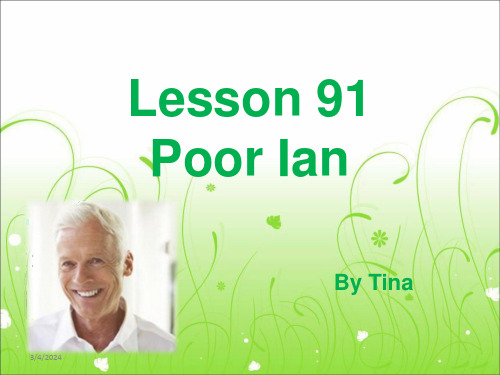
come to work→work等
• 现在完成时可表示持续到现在的动作或 状态,动词一般是延续性的,如
• live, teach, learn, work, study, know.
• 过去时常用的非持续性动词有: • come, go, leave, start, die, finish,
become, get married.
特疑词+ have (has)+主语+p.p?
(2) 表示动作发生在过去某个不确定的时间, 但对现在留下了某种影响和结果。 常被just、already、yet 等副词修饰。
-Have you had lunch yet? 你(已经)吃午饭了吗? -Yes, I have. I‘ve just had it. 我刚刚吃过。(现在我不饿了)
(强调动作,过程)
move out (of) 搬出来
move away
搬走
move from…to…
从…搬到…
②感动,打动
This story moved me. 这个故事感动了我。 The news moved him very much. 这消息使他很感动。
Байду номын сангаас
★ miss [mis] v. 想念,思念
★ person ['pə:sən] n. 人
He is a nice/good person. 他是个好人。 in person 亲自,直接的 He will go to get the money in person. 他将亲自去取钱。
★ personal adj. 个人的,私人的
['pə:sənəl]
• The patient is lying still. • 病人安静地躺着。
新概念一册Lesson91 Poor Ian

Grammar
一般将来时
I am going to see a play. She is going to go fishing. He is going to play football.
Move from…to…从…搬到… They moved from Nanjing to Shenzhen. 我们从乡村搬到城市。 We moved from country to city. 我们从南充搬到成都。 We moved from south to Chengdu.
来看这一组句子
He didn’t want to leave this house. No, he didn’t want to leave, but his wife did. 第二个句子是对第一个句子的证实,这里不可以 按照中文习惯去赞同别人的说法,而是要根据 事实来说,因此回答no, he didn’t want to leave. 但是翻译成中文的时候要说,是的,他 不愿意离开。 例句: He didn’t go to school last week, did he? No, he didn’t. 是的,他没去。 Yes, he did. 不,他去了的。
He has always been a good neighbour. 现在完成时 指Ian自从在这住开始到现在一直都很好 He’s a very nice person. 表达人的人品很好可以用good或nice。 person 强调的个体的人,可以有复数形 式persons people 通常是人的统称“人们,人民”, 本身是复数形式,没有单数形式
Listen and answer
Ian’s want wife.to sell the Who house?
新概念英语第一册第91-92课-Poor-Lan
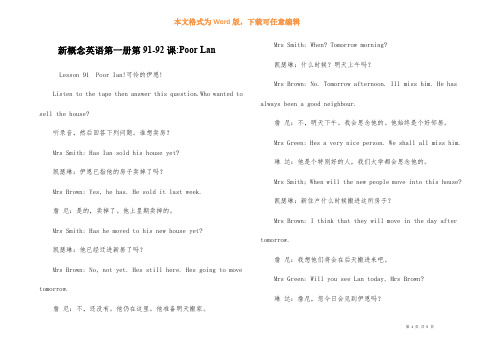
新概念英语第一册第91-92课:Poor LanLesson 91 Poor Ian!可怜的伊恩!Listen to the tape then answer this question.Who wanted to sell the house?听录音,然后回答下列问题。
谁想卖房?Mrs Smith: Has Ian sold his house yet?凯瑟琳:伊恩已指他的房子卖掉了吗?Mrs Brown: Yes, he has. He sold it last week.詹尼:是的,卖掉了。
他上星期卖掉的。
Mrs Smith: Has he moved to his new house yet?凯瑟琳:他已经迁进新居了吗?Mrs Brown: No, not yet. Hes still here. Hes going to move tomorrow.詹尼:不,还没有。
他仍在这里。
他准备明天搬家。
Mrs Smith: When? Tomorrow morning?凯瑟琳:什么时候?明天上午吗?Mrs Brown: No. Tomorrow afternoon. Ill miss him. He has always been a good neighbour.詹尼:不,明天下午。
我会思念他的。
他始终是个好邻居。
Mrs Green: Hes a very nice person. We shall all miss him.琳达:他是个特别好的人,我们大学都会思念他的。
Mrs Smith; When will the new people move into this house?凯瑟琳:新住户什么时候搬进这所房子?Mrs Brown: I think that they will move in the day after tomorrow.詹尼:我想他们将会在后天搬进来吧。
Mrs Green: Will you see Lan today, Mrs Brown?琳达:詹尼,您今日会见到伊恩吗?Mrs Brown: Yes, I will.詹尼:是的,我会见到他。
新概念英语第一册91课

③注意到…的不存在
• When did you miss your bag? • 你什么时候发现提包不见的?
poor
adj. ①可怜的 The poor old woman had no one to talk to. 那个可怜的老人找不到人跟她说话。 ②贫穷的 a poor man 贫穷的人 the poor 穷人 We should help the poor. ③笨拙的,差劲的 be good at sth./be good at doing sth. be poor at sth./ be poor at doing sth. 不擅于… rich
JENNY: I think that they'll move in the day after tomorrow. LINDA: Will you see Ian today, Jenny? JENNY: Yes, I will.
将来时的时间状语
I think + that 从句。 我认为…
否定形式:I don’t think + that 从句。 我认为不…
person强调单数“一个人”
people 强调复数“许多人,人们”,为集合名 词。
一般将来时
I’ll miss him. 我会想念他的。
表示将来某个时间要发生的动作或存在的状态,常与表示将来的时间 状语连用。
将来时的构成:
助动词shall (第一人称) + 动词原形
或 will(第一、二、三人称)+ 动词原形 注意:现代英语中所有人称都可以用will。但在第一人
还,仍旧
['p i :p l ] 人们 [p 可怜的 (r)]
★still
Lesson 91 Poor Ian!可怜的伊恩

13.
14. 15. 16.
be poor in/be good at 不擅长-----tomorrow morning/afternoon/evening/night the day after tomorrow the night after next 后天夜里 the night before last 前天晚上 the day before yesterday 前天 *drive home开车送回家/drive me home have a haircut 理发 *have a shave =shave [Seiv] vt. & vi.(用剃刀)刮(胡须等); 为(某人) 剃毛发 e.g. John has to shave twice a day. When my dad shaved his beard (off), he looked ten years younger.
5.
be going to 表示事先经过考虑的打算;will多表示 意愿、决心。 I have bought some books and I am going to learn Korean by myself.(不能用will)
③
already和yet的区别: already常用于肯定句或句末;yet常用于一般疑问 句或否定句末。表惊讶时already也可用于疑问句 。如: Tom has already finished his homework. Tom hasn’t finished his homework yet. What! Have you already finished it?
Comprehension 理解
6.
7.
8.
9.
How much does Ian’s house cost? It costs £68.500. Is it a lot of money to Nigel? Yes, it does. Does Nigel like the house? Yes, he does. Why can’t he decide at the moment? Because his wife has to see the house.
新概念英语第一册91-92课笔记.doc
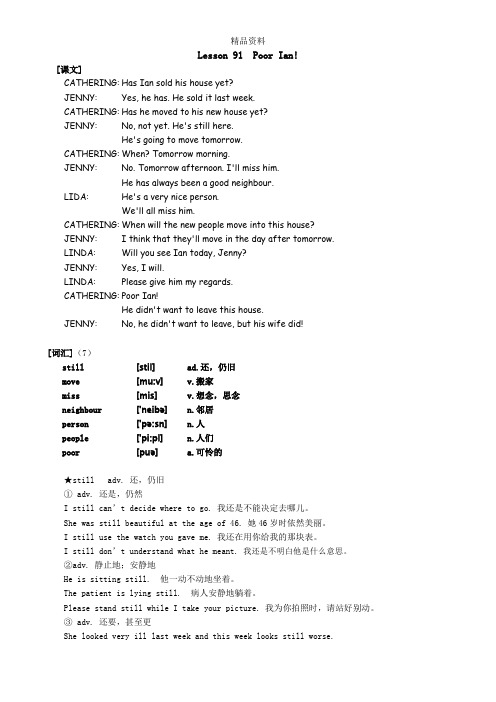
Lesson 91 Poor Ian![课文]CATHERING: Has Ian sold his house yet?JENNY: Yes, he has. He sold it last week.CATHERING: Has he moved to his new house yet?JENNY: No, not yet. He's still here.He's going to move tomorrow.CATHERING: When? Tomorrow morning.JENNY: No. Tomorrow afternoon. I'll miss him.He has always been a good neighbour.LIDA: He's a very nice person.We'll all miss him.CATHERING: When will the new people move into this house?JENNY: I think that they'll move in the day after tomorrow.LINDA: Will you see Ian today, Jenny?JENNY: Yes, I will.LINDA: Please give him my regards.CATHERING: Poor Ian!He didn't want to leave this house.JENNY: No, he didn't want to leave, but his wife didstill [stil]ad.还,仍旧move [mu:v]v.搬家miss [mis]v.想念,思念neighbour ['neibə] n.邻居person ['pə:sn] n.人people ['pi:pl] n.人们poor [puə] a.可怜的★still adv. 还,仍旧① adv. 还是,仍然I still can’t decide where to go. 我还是不能决定去哪儿。
新概念英语第一册lesson91-92
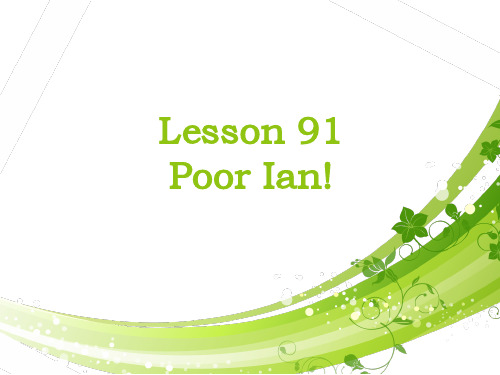
6.He’s a very nice person.
表达人的人品很好可以用 good或nice。 He's a good guy. He is a nice man.
他是个好人。
7.When will the new people move into this house? move to = move into 搬进。 people = neighbours
Lesson 91 Poor Ian!
New Words
still move miss neighbor person people poor
adv. 还,仍旧 v. 搬家 v. 想念,思念 n. 邻居 n. 人 n. 人们 adj. 可怜的
Free talk
Do you liken the blanks.
LIDA:He's a very nice person.We'll all miss him. CATHERING:When will the new people move into this house? JENNY:I think that they'll move in the day after tomorrow. LINDA:Will you see Ian today, Jenny? JENNY:Yes, I will. LINDA:Please give him my regards. CATHERING: Poor Ian!He didn't want to leave this house. JENNY:No, he didn't want to leave.but his wife did!
Why?
Fill in the blanks.
新概念英语第一册第91课
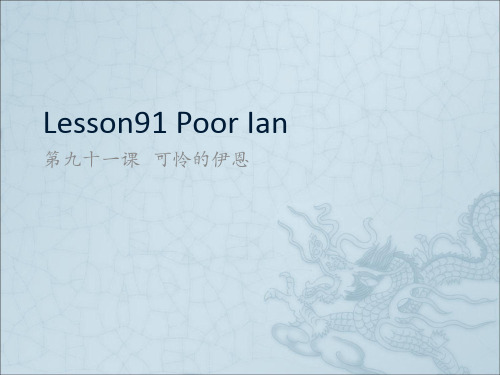
语法 演讲
口语表达 作文
目前尚可 由于时间关系未进行
由于时间关系未进行 不错,但注意一些细节的语法问题
其他需要注意 做题的时候要仔细,开口的时候要大胆。
Let’s learn more
Person 表示单个人 People 表示人们,是复数。 She’s the right person for this job. There’re a lot of people in the park. 我们家有三口人。 他是做老师的不错人选。
homework
1.翻译短文。听写91,35,36单词,错一个改 五遍。并背会课文。 2.自己安排读课文、预习课文和自学课文. 每天都要保证高质量地读两遍。 3.每天复述一遍课文。 4.奥特曼打小怪兽 5.准备演讲,题目自拟。准备Topic.
冯千禧五年级下第3次课堂表现
日期 作业 态度 听力 发音 语音语调 2011年2月26日 完成得很好 上课态度认真,只是在纠音的过程中觉得有点枯燥 需要仔细分辨资料中容易混淆的句子 希望每次发音的时候都能够将口型完全打开,声音放出来 常常有开头部分读得重,越到后来声音越轻的现象,希望尽快矫 正。
一般将来时
一般将来时表示将来某一时刻的动作或状 态,或将来某一段时间内经常的动作或状 态。常常和表示将来的时间状语连用。如: tomorrow(明天), next week(下周), from now on(从现在开始);in the future (将来)等。 一般将来时由助动词shall (第一人称),will(第二、三人称) 动词 原形构成。美国英语则不管什么人称,一 律用will。
来看这一组句子
- 1、下载文档前请自行甄别文档内容的完整性,平台不提供额外的编辑、内容补充、找答案等附加服务。
- 2、"仅部分预览"的文档,不可在线预览部分如存在完整性等问题,可反馈申请退款(可完整预览的文档不适用该条件!)。
- 3、如文档侵犯您的权益,请联系客服反馈,我们会尽快为您处理(人工客服工作时间:9:00-18:30)。
(美音版)新概念英语第一册:Lesson 91 Poor Ian!
Lesson 91 Poor Ian!
可怜的伊恩!
Listen to the tape then answer this question.
听录音,然后回答问题。
Who wanted to sell the house?
谁想卖房?
Has Ian sold his house yet?
伊恩已把他的房子卖掉了吗?
Yes, he has.
是的,卖掉了。
He sold it last week.
他上星期卖掉的。
Has he moved to his new house yet?
他已经迁进新居了吗?
No, not yet.
不,还没有。
He's still here.
他仍在这里。
He's going to move tomorrow.
他打算明天搬家。
When? Tomorrow morning?
什么时候?明天上午吗?
No. Tomorrow afternoon.
不,明天下午。
I'll miss him.
我会想念他的。
He has always been a good neighbour.
他一直是个好邻居。
He's a very nice person.
他是个非常好的人,
We'll all miss him.
我们大家都会想念他的。
When will the new people move into this house?
新住户什么时候搬进这所房子?
I think that they'll move in the day after tomorrow.我想他们将在后天搬进来吧。
Will you see Ian today, Jenny?
詹尼,您今天会见到伊恩吗?
Yes, I will.
是的,我会见到他。
Please give him my regards.
请代我问候他。
Poor Ian!
可怜的伊恩!
He didn't want to leave this house.
他本不想离开这幢房子。
No, he didn't want to leave, but his wife did!是啊,他是不想离开,不过他妻子要离开。
